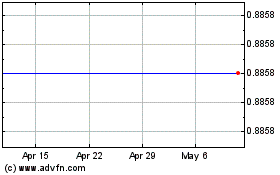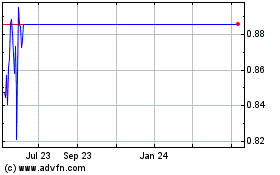WASHINGTON—Big European banks have made no secret of their
efforts to slim down, but little-noticed regulatory filings show
just how deep their cuts on Wall Street have been.
Barclays PLC reduced assets at its U.S. brokerage, Barclays
Capital, by 43% between the end of 2013 and the beginning of this
year, according to filings with the Securities and Exchange
Commission. Assets at Deutsche Bank's U.S. broker-dealer, Deutsche
Bank Securities, were down 30% during that period, while Credit
Suisse Group AG's U.S. brokerage shrank by 26%.
The banks have all said they remain committed to the U.S. and
are seeking to expand parts of their American businesses. But they
are slimming down overall, thanks to tougher business conditions
and stricter regulations unfolding in the U.S.
Their American rivals also shrank, but by thinner margins.
Brokerage businesses owned by J.P. Morgan Chase & Co.,
Citigroup Inc., Goldman Sachs Group Inc. and Morgan Stanley cut
assets by an average of 8% over the past two years.
The filings show that securities financing, the business of
providing short-term loans to financial clients such as hedge
funds, was among those hardest hit by the cutbacks.
Banks globally have cut thousands of investment-banking jobs,
part of a broader retreat from riskier business lines as a result
of new rules that make such operations more burdensome and adverse
economic conditions that shrink the pie of profits.
In some ways, the European banks are playing catch-up with
American counterparts that adapted to strictures put in place after
the 2008 financial crisis and got their balance sheets in order
years earlier.
"You are not seeing full-blown retrenchment" by European banks,
but "it's pretty clear to me that the big U.S. banks are certainly
taking share from the Europeans," said Steven Chubak, an analyst
with Japanese brokerage Nomura Holdings Inc.
New Federal Reserve rules on foreign banks kicked in July 1 with
the requirement that banks form a single, Fed-regulated U.S.
holding company. Until recently, many foreign-owned banks had kept
brokerage businesses legally separate from their U.S. bank
subsidiaries, insulating the brokerage businesses from leverage and
capital rules imposed on U.S. banks after the financial crisis,
even though the foreign-owned brokerages are among the largest
players on Wall Street.
"A few foreign banks would prefer the old system, under which
they held relatively little capital in their very extensive U.S.
operations," Daniel Tarullo, the Fed's regulatory czar, said in a
2014 speech explaining the new rules. "But that was neither safe
for the financial system nor particularly fair to their
competitors."
Foreign-owned banks have said the U.S. rules discriminate
against them by imposing an additional layer of regulation on top
of what their parent companies face at home.
U.S. regulators have created "some real competitive challenges
for the foreign banks," said Richard Coffman, general counsel at
the trade group Institute of International Bankers.
U.S. banks face some similar rules abroad, such as capital
requirements—but aspects of the U.S. rules are tougher. The Bank of
England isn't stress-testing U.S. banks operating in the U.K. even
though U.K. firms are subject to the U.S. stress tests.
Under the new Fed rules, to be phased in through 2018, large
foreign-owned banks will have to pass the Fed's annual stress
tests, satisfy regulators that they have credible "living will"
bankruptcy plans, and meet minimum capital requirements.
Building a stress-testing program can cost a bank $150 million
to $250 million. The banks must produce reliable data on risk
exposures across millions of loans and investments.
Deutsche Bank is one of several non-U.S. banks to have taken the
stress tests already, since it owns a U.S. banking subsidiary with
more than $50 billion in assets. Deutsche Bank Trust Corp. has
failed the test each of the past two years. By 2018, the entirety
of the bank's U.S. operations will be subject to the test—as will
those of other foreign banks whose new U.S. holding companies have
assets greater than $50 billion, a group likely to include
Barclays, Credit Suisse, and UBS Group AG.
Banks that fail the test face restrictions on returning profits
to their parents.
Foreign banks also have until July 2017 to show U.S. regulators
that they have credible plans to dismantle their newly formed
holding companies without government assistance if they become
insolvent.
The new capital rules kick in by 2018 and will require foreign
banks' U.S. operations to meet minimum levels of equity. They can
raise it from investors, retain more profits or shrink.
Barclays has shrunk. Its U.S. brokerage, Barclays Capital, had
about $172 billion in assets at the end of 2015, compared with $304
billion two years earlier. Still, the company's U.S. business is
strong, Barclays Chief Executive Jes Staley said last week,
accounting for 60% of investment-bank revenue in the first half of
2016.
(END) Dow Jones Newswires
August 03, 2016 18:35 ET (22:35 GMT)
Copyright (c) 2016 Dow Jones & Company, Inc.
Credit Suisse (NYSE:CS)
Historical Stock Chart
From Mar 2024 to Apr 2024

Credit Suisse (NYSE:CS)
Historical Stock Chart
From Apr 2023 to Apr 2024
